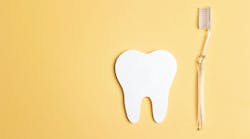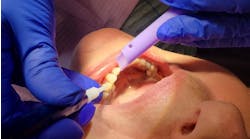Maintaining oral health is essential for general well-being and a healthy smile—an important concept to keep in mind even during vacation periods. Proper oral hygiene is crucial for ensuring good dental health. Certain foods can help promote dental and gum health while freshening breath. As summer vacations approach, consider these tips to achieve better oral health and a brighter smile.
Tips to promote oral health
Water: Adequate hydration is important for saliva production. Saliva is a crucial defense mechanism for the mouth as it helps to rinse bacteria from the mouth. Adults should drink at least 1–1.5 liters per day, according to Dr. Jukka Meurman, professor emeritus of oral and maxillofacial diseases at the University of Helsinki, Finland.1
Dairy products: Dairy products such as milk, cheese, and yogurt are rich in calcium and phosphorus, which help strengthen tooth enamel. In addition to lactose, calcium, and phosphorus, dairy proteins have been shown to impact dental health. Caseins are the most abundant protein group in cow’s milk, accounting for about 80% of its total protein content.2
Crunchy fruits and vegetables: Consuming fiber-rich foods helps keep teeth and gums clean, as noted by the American Dental Association. Foods such as apples, carrots, celery, and cucumbers are high in fiber and require chewing, which stimulates saliva production and helps maintain a healthy smile. Research has also shown an inverse relationship between fruit consumption and periodontitis. In other words, the more fiber-rich fruits consumed, the lower the risk of serious gum diseases such as periodontitis.3
Leafy greens: Spinach, kale, and other leafy vegetables are rich in vitamins and minerals such as calcium, folic acid, and B vitamins, which promote oral health.4
Lean proteins: Foods such as chicken, turkey, and lean beef contain phosphorus, which is essential for strong teeth and bone tissue. Lean proteins are also rich in essential amino acids, the building blocks of proteins, which are vital for gum tissue health.5
Nuts and seeds: These provide healthy fats, protein, and minerals such as calcium and phosphorus, which are beneficial for oral health.
Green tea: Green tea is one of the world’s most popular beverages and has been shown to positively impact human health. Green tea contains antioxidants called catechins, which can help reduce inflammation in the mouth and fight bacteria.6
Xylitol: Xylitol is a natural sweetener that helps reduce the amount of Streptococcus mutans bacteria in dental plaque and saliva. S. mutans is the main cause of tooth decay. Chewing gum containing xylitol can stimulate saliva production and help reduce the risk of tooth decay. The recommended daily dose of xylitol for caries prevention is 6–10 grams per day.7,8
Lingonberries: Lingonberries are used in traditional Finnish medicine to treat oral yeast infections, among other things. Lingonberries contain compounds, similar to those found in cranberries, that may prevent bacteria from adhering to teeth, reducing the risk of decay. Lingonberries are a promising natural approach to improving oral health due to their antioxidant, anti-inflammatory, antiproteolytic, cancer-preventive, and antimicrobial effects.8
Unflavored yogurt: Consuming yogurt, especially unflavored or low-sugar yogurt, can be beneficial for oral health and help manage bad breath. Yogurt is a good source of probiotics. Probiotics are beneficial bacteria that can also help balance oral microbiota. Imbalanced oral microbiota can contribute to halitosis. The best yogurts for dental health are unflavored and Greek yogurts, as they often contain the most probiotics. Yogurt also contains plenty of calcium, which helps keep teeth strong.9
Taking oral hygiene to the next level
While drinking water and consuming certain foods can be beneficial for oral health, careful daily oral hygiene routines are crucial for maintaining a healthy mouth. These habits include regular brushing, flossing, and dental checkups. Adding antibacterial treatment to the mix of daily oral care can enhance the effects of professional oral care.
Reducing the consumption of sugary and acidic foods and drinks can also help prevent tooth decay, gum diseases, and dental erosion. The peak time for soft drink use is during the summer season when heat encourages increased consumption of various flavored beverages. Drinking carbonated beverages is also a leading cause of tooth decay, especially during warm seasons. Carbonation, sugar, and acids soften tooth enamel and promote the growth of bacteria that cause tooth decay.
When tooth enamel is exposed to challenges, managing oral biofilm, or dental plaque, becomes critical to prevent oral diseases such as gingivitis, periodontitis, and tooth decay. While mechanical teeth-cleaning methods are essential, research indicates that even high-quality electric toothbrushes remove only about 65% of harmful bacteria in the mouth.10
Incorporating antibacterial treatments into the daily oral care regimen enhances the effectiveness of toothbrushing. Studies demonstrate that Lumoral antibacterial treatment (not yet available in the US) significantly enhances preventive professional oral care outcomes by slowing down plaque formation and reducing the presence of harmful bacteria in the mouth.11
Editor’s note: This article first appeared in Clinical Insights newsletter, a publication of the Endeavor Business Media Dental Group. Read more articles and subscribe.
References
- The oral health benefits of drinking water. Smile Drs. July 23, 2021. https://smiledrs.com/the-oral-health-benefits-of-drinking-water/
- Shkembi B, Huppertz T. Impact of dairy products and plant-based alternatives on dental health: food matrix effects. Nutrients. 2023;15(6):1469. doi:10.3390/nu15061469
- Nielsen SJ, Trak-Fellermeier MA, Joshipura K, Dye BA. Dietary fiber intake is inversely associated with periodontal disease among US adults. J Nutr. 2016;146(12):2530-2536. doi:10.3945/jn.116.237065
- Foods that boost your oral health. Progressive Periodontics, Implants and Laser Therapy. February 22, 2022. https://www.myperiopro.com/about-us/blog/2022/february/foods-that-boost-your-oral-health/
- Jayasinghe TN, Harrass S, Erdrich S, King S, Eberhard J. Protein intake and oral health in older adults–a narrative review. Nutrients. 2022;14(21):4478. doi:10.3390/nu14214478
- Chatterjee A, Saluja M, Agarwal G, Alam M. Green tea: a boon for periodontal and general health. J Indian Soc Periodontol. 2012;16(2):161-167. doi:10.4103/0972-124X.99256
- Nayak PA, Nayak UA, Khandelwal V. The effect of xylitol on dental caries and oral flora. Clin Cosmet Investig Dent. 2014;6:89-94. doi:10.2147/CCIDE.S55761
- Pärnänen P, Lähteenmäki H, Tervahartiala T, Räisänen IT, Sorsa T. Lingonberries–general and oral effects on the microbiome and inflammation. Nutrients. 2021;13(11):3738. doi:10.3390/nu13113738
- Ferrazzano GF, Cantile T, Quarto M, Ingenito A, Chianese L, Addeo F. Protective effect of yogurt extract on dental enamel demineralization in vitro. Aust Dent J. 2008;53(4):314-319. doi:1111/j.1834-7819.2008.00072.x
- Pakarinen S, Saarela RKT, Välimaa H, et al. Home-applied dual-light photodynamic therapy in the treatment of stable chronic periodontitis (HOPE-CP)—three-month interim results. Dent J (Basel). 2022;10(11):206. doi:10.3390/dj10110206
- Aggarwal N, Gupta S, Grover R, Sadana G, Bansal K. Plaque removal efficacy of different toothbrushes: a comparative study. Int J Clin Pediatr Dent. 2019;12(5):385-390. doi:10.5005/jp-journals-10005-1669









